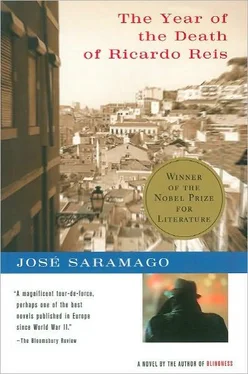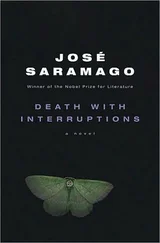José Saramago - Year of the Death of Ricardo Reis
Здесь есть возможность читать онлайн «José Saramago - Year of the Death of Ricardo Reis» весь текст электронной книги совершенно бесплатно (целиком полную версию без сокращений). В некоторых случаях можно слушать аудио, скачать через торрент в формате fb2 и присутствует краткое содержание. Год выпуска: 1992, ISBN: 1992, Издательство: Houghton Mifflin Harcourt, Жанр: Современная проза, на английском языке. Описание произведения, (предисловие) а так же отзывы посетителей доступны на портале библиотеки ЛибКат.
- Название:Year of the Death of Ricardo Reis
- Автор:
- Издательство:Houghton Mifflin Harcourt
- Жанр:
- Год:1992
- ISBN:9780547546926
- Рейтинг книги:4 / 5. Голосов: 1
-
Избранное:Добавить в избранное
- Отзывы:
-
Ваша оценка:
- 80
- 1
- 2
- 3
- 4
- 5
Year of the Death of Ricardo Reis: краткое содержание, описание и аннотация
Предлагаем к чтению аннотацию, описание, краткое содержание или предисловие (зависит от того, что написал сам автор книги «Year of the Death of Ricardo Reis»). Если вы не нашли необходимую информацию о книге — напишите в комментариях, мы постараемся отыскать её.
Year of the Death of Ricardo Reis — читать онлайн бесплатно полную книгу (весь текст) целиком
Ниже представлен текст книги, разбитый по страницам. Система сохранения места последней прочитанной страницы, позволяет с удобством читать онлайн бесплатно книгу «Year of the Death of Ricardo Reis», без необходимости каждый раз заново искать на чём Вы остановились. Поставьте закладку, и сможете в любой момент перейти на страницу, на которой закончили чтение.
Интервал:
Закладка:
A man must read widely, a little of everything or whatever he can, but given the shortness of life and the verbosity of the world, not too much should be demanded of him. Let him begin with those titles no one should omit, commonly referred to as books for learning, as if not all books were for learning, and this list will vary according to the fount of knowledge one drinks from and the authority that monitors its flow. In the case of Ricardo Reis, educated by Jesuits, we can form some idea despite the considerable difference between the teachers of yesterday and those of today. Then come the inclinations of youth, those favorite authors, those passing infatuations, those readings of Werther spurring one to suicide or self-preservation, then on to the serious reading of adulthood. Once we reach a certain stage in life we all read the same things more or less, although the starting point always makes a difference, and the living have the distinct advantage of being able to read what others, because they are dead, will never know. To give but one example, here is Alberto Caeiro, who, having died in nineteen fifteen, poor fellow, did not read Nome de Guerra, he has no idea what he missed, and Fernando Pessoa, and Ricardo Reis too, will depart this world before Almada Negreiros publishes his novel. This is almost a repetition of the amusing tale about the gentleman from La Palice, who a quarter of an hour before dying was still alive and kicking, as those wits would say. Not for a moment did he contemplate the sorrow of no longer being alive and kicking a quarter of an hour hence. Let us move on. A man, then, will sample everything, even Conspiracy , and it will do him no harm whatsoever to come down every now and then from the clouds where he is in the habit of taking refuge, in order to see how commonplace thoughts are forged, because it is these that help people exist from day to day, not those of Cicero or Spinoza. All the more so, when the recommendation, a nagging exhortation, comes from Coimbra, Read Conspiracy , my friend, there you will find some sound opinions, any weaknesses of form or plot are compensated for by the worthiness of the message. Coimbra, most learned of cities, teeming with scholars, knows what it is talking about. The very next day Ricardo Reis went out and bought the slim volume, took it up to his room, unwrapped it furtively, for not all acts carried out behind closed doors are what they appear, sometimes they are nothing other than a person's shame at his own private habits, secret pleasures, picking his nose, scratching his scalp. Perhaps this cover, which shows a woman in a raincoat and cap walking down a street by a prison, the barred window and sentry box eliminating any doubt about the fate of conspirators, is no less embarrassing. Ricardo Reis, then, is in his room, comfortably settled on the sofa. It is raining wherever one looks, as if the sky were a suspended sea draining interminably through countless leaks. Everywhere there is flood and famine, but this little book will tell how a woman's soul launched itself into the noble crusade of restoring to reason and to the nationalist spirit a man whose mind became confused by dangerous ideas. Women are extremely able in such matters, perhaps to atone for those wiles more akin to their nature, by which they have perturbed and brought about the downfall of men since Adam. Ricardo Reis has now read the first seven chapters, namely, On the eve of the election, A bloodless coup, The fable of love, The feast of the Holy Queen, A university strike, Conspiracy, and The senator's daughter. The plot is as follows, a university student, a farmer's son, gets into some mischief, is arrested, locked up in the prison of Aljube, and it is the daughter of the aforementioned senator who with patriotic fervor and missionary zeal will move heaven and earth to secure his release, which is not all that difficult in the end, because to the astonishment of the man who brought her into the world, this senator who belonged to the democratic party but is now an unmasked conspirator, she is much esteemed in the upper spheres of government, a father can never tell how his own daughter will turn out. Though there are of course certain differences, she speaks like Joan of Arc. Papa was on the point of being arrested several days ago, I gave my word of honor that Papa would not evade his responsibilities, I also guaranteed that Papa would stop his plotting. Such filial devotion, so touching, Papa invoked three times in one sentence, the bonds of affection reach such extremes in life. The devoted girl continues, You may attend your meeting arranged for tomorrow, nothing will happen to you, I promise, because I know and the police also know that the conspirators are meeting again, but they have decided to turn a blind eye, such a benevolent, kind-hearted police force here in Portugal, and little wonder, since they have an informer in the enemy camp, none other, would you believe it, than the daughter of a former senator and opponent of this regime. Family traditions have been betrayed, but all will end happily for the parties in question if we take the author of the work seriously. Let us now hear what he has to say, The situation in our country has been discussed with enthusiasm in the foreign press, our economic strategy has been upheld as a model, there are constant admiring references to our monetary policies, throughout the land industrial projects continue to provide employment for thousands of workers, every day the newspapers outline governmental steps to overcome the crisis which, on account of world events, has also affected us, but when compared with that of other countries the state of our economy is most encouraging, the Portuguese nation and the statesmen who guide her are quoted worldwide, the political doctrine we pursue here is being studied abroad, and one can confidently say that other nations regard us with envy and respect, the world's leading newspapers send their most experienced journalists to discover the secret of our success, the head of our government is finally coaxed out of his persistent humility, out of his stubborn aversion to publicity, and is featured in newspaper columns throughout the world, his image is given maximum exposure and his political pronouncements are transformed into an evangelical mission. In the face of all this, which is only a pale shadow of what could be said, you must agree, Carlos, that it was utter madness to become involved in university strikes which have never achieved anything worthwhile, are you even aware of the trouble I'm going through to get you out of here. You are right, Marilia, but the police have no proof that I did anything wrong, all they know for certain is that it was I who waved the red flag, which wasn't a flag at all or anything remotely like a flag, it was only a handkerchief that cost twenty-five cents, a prank. This conversation takes place in the prison, in the visitors' room, but in a village, also as it happens in the district of Coimbra, another farmer, the father of the sweet girl whom this Carlos will marry toward the end of the story, explains to a gathering of subordinates that there is nothing worse than being a Communist, the Communists want neither bosses nor workers, they don't accept laws or religion, they don't believe anyone should be baptized or get married, for them love does not exist, woman is a fickle creature, all men are entitled to use her, children are not answerable to their parents, and everyone is free to behave as he likes. In another four chapters and in the epilogue, the gentle but Valkyrian Marilia rescues the student from prison and the political scourge, rehabilitates her father who abandons his subversive activities once and for all, and declares that within the new corporative plan the problem is being resolved without hypocrisy, conflict, or insurrection. The class struggle is over and has been replaced with a system of good values, capital, and labor. To conclude, the nation must be run like a family with lots of children, where the father imposes order to safeguard their education, because unless children are taught to respect their father everything falls apart and the household is doomed. Bearing these irrefutable facts in mind, the two landowners, the fathers of the bride and groom, after settling some minor disagreements, even help to resolve certain little conflicts between the workers, God need not have bothered expelling us from His paradise, seeing as we have succeeded in regaining it so soon. Ricardo Reis closed the book, it hadn't taken him long to read it. These are the best lessons of all, concise, brief, almost instantaneous, Such stupidity, with this outburst he repays the absent Doctor Sampaio and for a moment loathes the entire world, the incessant rain, the hotel, the book tossed on the ground, Marcenda. But then he decides, without quite knowing why, to exempt Marcenda, perhaps simply for the pleasure of saving something, just as we pick up a piece of wood or stone from a pile of rubble. The shape caught our eye, and without the courage to throw it away we end up putting it in our pocket, for no good reason.
Читать дальшеИнтервал:
Закладка:
Похожие книги на «Year of the Death of Ricardo Reis»
Представляем Вашему вниманию похожие книги на «Year of the Death of Ricardo Reis» списком для выбора. Мы отобрали схожую по названию и смыслу литературу в надежде предоставить читателям больше вариантов отыскать новые, интересные, ещё непрочитанные произведения.
Обсуждение, отзывы о книге «Year of the Death of Ricardo Reis» и просто собственные мнения читателей. Оставьте ваши комментарии, напишите, что Вы думаете о произведении, его смысле или главных героях. Укажите что конкретно понравилось, а что нет, и почему Вы так считаете.












